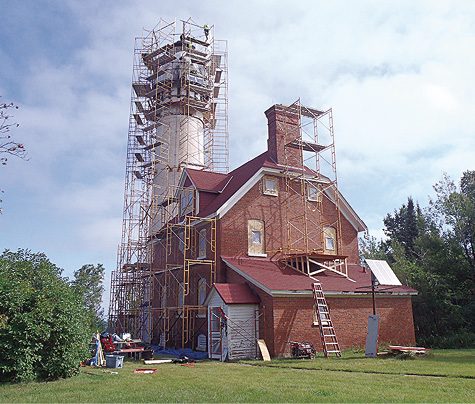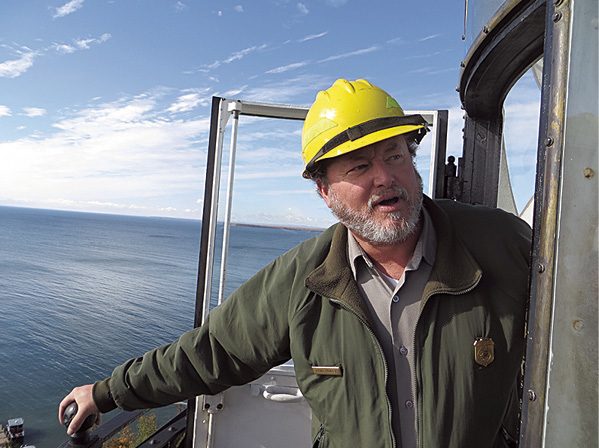The John L. Cotter Award for Excellence in National Park Service (NPS) Archeology is awarded annually to “recognize the archeological accomplishments of NPS staff or partnership researchers within the NPS,” and this year’s ‘Cotter Award’ was awarded to local archeologist and cultural resource specialist David J. Cooper.
“Throughout my career,” says Cooper, “I have had the privilege of working closely with all sorts of incredible people and incredible cultural resources on this Lake [Superior]. Shipwrecks, lighthouses, traditional blueberry sites, ancient fishing sites… it’s been a heck of an experience, and I am very honored to have been recognized for it.”
Archeology is not something often associated with the North Shore, or Lake Superior for that matter, despite having a human history that goes back thousands of years. People have been living along Lake Superior ever since the glaciers receded after the most recent ice age, and Cooper has devoted the better part of his career to learning and preserving their stories.
Cooper was born and raised in Northern Wisconsin along the shores of Lake Michigan. He has always been drawn to the history of the Great Lakes and considers this place to be his home.
“Where I grew up had a similar feel to where I am now,” says Cooper, referring to his current home in Bayfield, Wisc. “There were lots of orchards, good ‘big lake’ fishing, summer tourism, and the expected long winters.”
Cooper completed his undergrad at UW Madison, before moving to the southeast to finish grad school at North Carolina. Shortly after graduation, Cooper took a job excavating a revolutionary war battleship for the state of Virginia, which is where he got his start in marine archeology.
“It was a little bit of being in the right place at the right time,” says Cooper, referring to his early involvement with Wisconsin’s underwater archeology program and the U.S. Navy’s marine archeological program, respectively.

“Right around the time that I was gaining experience working for the state of Virginia,” continues Cooper, “federal legislation passed regarding the preservation of shipwrecks. This was when the Titanic was discovered, which sparked a realization that there were lots of historical shipwrecks in American waters that, up until then, had not received much protection or even recognition as historical resources.”
Cooper has had a storied career as an archeologist and as a cultural resource specialist with the NPS. Prior to his time with the NPS, Cooper founded Wisconsin’s underwater archeology program; helped create the U.S. Navy’s marine archeology program that focuses on submerged revolutionary war, civil war, and WWII sites; and spent time in Great Britain doing medieval archeology on “fortifications, monasteries, and other archeological sites from similar periods.”
In 1998 Cooper became the Archeologist and Cultural Resource Specialist at Grand Portage National Monument, a position he held for over a decade. While working at Grand Portage, Cooper also became involved with the North House Folk School, joining, among other things, in a cooperative effort between the North House and the NPS to reconstruct a historic Mackinaw boat.
“Doing archeology in the Minnesota Northwoods is like finding a needle in a haystack,” says Cooper, “more so then, let’s say, excavating a shipwreck or a medieval monastery.”
“The archeological remains [around Grand Portage] are subtle,” continues Cooper, “and what people left behind is very sparse. Sometimes all we find are stains in the soil, or maybe a few scattered piles of artifacts.”
Much of Cooper’s archeological work from his time on the North Shore is on display today in the new visitor’s center at the Grand Portage National Monument. It is well worth the visit for anyone who has yet to experience the new exhibits.
In 2010, Cooper transitioned to his current role with the NPS on the South Shore preserving the cultural resources of the Apostle Islands.
“I went from working in a fairly small park unit in Grand Portage,” says Cooper, “to working at the Apostle Islands, an area the size of Rocky Mountain National Park.”
“In Grand Portage,” continues Cooper, “my job was defined by intensive work on a very focused and specific area. In the Apostles, now, my work covers a much broader area with bigger environmental and archeological challenges to overcome.”
Working for the NPS as a cultural resource specialist has required Cooper to “wear many hats.” In addition to working as an archeologist for the parks that he is involved with, Cooper serves as historian, manages the museum’s collections and archives, is responsible for “environmental compliance and reviews” of actions taken by or within the park, and has responsibilities related to programming and special events.
Today, much of Cooper’s work in the Apostle Islands revolves around the restoration of historic lighthouses on the islands—a multi-year, multi-million-dollar endeavor that has been ongoing for quite a few years now.
Outside of lighthouse preservation, though, Cooper has a number of other projects on his plate, including excavating sites from the time when the Apostle Islands first emerged from the Lake 5,000-6,000 years ago and overseeing a traditional blueberry burn on Stockton Island.
“Studying the earliest sites on the Apostle Islands is a very important opportunity for us,” says Cooper, “but perhaps even more so for the tribes.”
“The tribes,” continues Cooper, “have been particularly excited about the recently discovered ancient heritage sites, and furthering their understanding of how long their ancestors have been a part of this area, using the waters and Islands of Lake Superior.”
To learn more about the Apostle Islands and David Cooper’s ongoing work, visit the official NPS Apostle Island website: nps.gov/apis/learn/index.htm.

